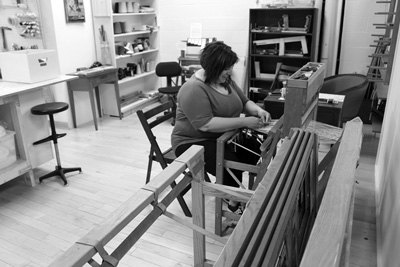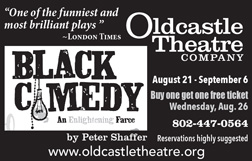News & Issues August 2015
Community creativity
North Adams’ new Makers Mill offers space, equipment for artistry
 By JOHN SEVEN
By JOHN SEVEN
Contributing writer
NORTH ADAMS, Mass.
Amanda Hartlage works at a loom at the new Makers Mill in downtown North Adams. The facility, which opened in June in a Main Street storefront, provides space and equipment for members to pursue a wide range of creative projects. John Seven photo
The Facebook post sounded like a lonely hearts ad in search of a mad inventor.
“Are you a DIY type with a garage or extra bedroom full of awesome or crazy projects that most people would never dream of trying?” it asked. “You’re not alone. Please join us for a meet-up to discuss forming a makerspace.”
The meet-up set in motion a yearlong process of community building that led to the opening, in June, of the new North Adams Makers Mill, at 73 Main St.
Maker spaces are popping up all over, and Makers Mill is part of a larger movement of creative community spaces. The idea is to offer equipment and resources for do-it-yourself creativity. Maker spaces function as shared workspaces that can create new dynamics and fluidity within a creative community.
“Maker spaces generally are collaborative, community-based spaces to learn and produce and support,” explained Julia Dixon, the creative director of Makers Mill. “We’ve seen that kind of community support from the very beginning of this whole concept.”
The goal, Dixon says, was to build a creative space that would cater to any skill level its users required -- and do so through its most important component: its members.
“We have a bunch of people who have been involved early who know these types of art-making practices and have used this equipment,” Dixon said. “But we also want to hold workshops for folks who are just beginners and interested in something as basic as sewing and quilting and something as complicated as running a letterpress machine.”
The space currently includes bookbinding, letterpress and other printing-related equipment as well as looms, cutting boards and other tools of the fiber arts. More will be added as the membership and its range of interests grows.
Every piece of equipment in the space, Dixon said, was procured through donation. The stuff came from basements, closets, museums and other hideaways and is now available to anyone, six days a week.
Dixon said the idea is to promote “creative production in an open atmosphere,” with sharing -- of tools, ideas, techniques and advice – leading to entrepreneurial partnerships.
Members determine scope
Blair Benjamin, a member of the Makers Mill board, got the process moving. As director of Mass MoCA’s Assets For Artists, he already knew there was local interest in a shared creative space that offered training.
Benjamin connected with Dixon and board members Jeffrey Thomas and Emily Watts. Their planning led to the Facebook message and subsequent meet-up, which attracted 50 people – mainly those in the arts or other creative businesses – who hashed out what would be needed if such a space came to exist.
The group also sought information and inspiration from other similar organizations. They toured other maker spaces around Massachusetts, such as Zea Mays in Florence, Artisan’s Asylum in Somerville and Technocopia in Worcester, as well Tech Valley Center of Gravity in Troy, N.Y.
“Everybody that we talked to, all the staff and the founders and whoever we talked to in these spaces, said that maker spaces aren’t about equipment and they’re not about the facility and they’re not about the physical space -- they’re about a core group of users,” Dixon recalled. “If you have that core group of users, you’ve got your organization.”
The organizers started to turn to the specifics, Benjamin said.
“We formed some committees to look at the types of space that we would need, the types of disciplines that people would be interested in having in a maker space,” he said. “We started looking into the business plan and fund-raising side of things. It just kept building from there.”
Eventually, the group concluded that North Adams’ greatest need was for a maker space that offered resources for printing and fiber arts.
It was at a printing meet-up that Kate Barber joined, eventually becoming the space’s board chairwoman and prime mover in its development and operation.
“When I was in graduate school, I really wanted to be involved in a community space,” Barber said. “I really enjoyed working alongside other people and learning from people. Everyone does everything so differently. If you don’t see how other people are working, at least for me, it’s easy to get into a rut thinking there is only one way to do something.”
Building a community
The birth of Makers Mill was a whirlwind, with a far faster turnaround than most projects in North Adams. Organizers chose a “crowd-funding” model, eventually raising $12,000 through an IndieGogo campaign in March. Some 160 people made pledges in that campaign.
The group also pursued institutional partners for funding, forging alliances with the Massachusetts Museum of Contemporary Art, Storey Publishing, Williams College and the Massachusetts College of Liberal Arts.
The original plan was to be part of the now-on-hold Greylock Market in the city’s Heritage Park. Instead, Makers Mill moved to a downtown location, placing it in the center of the city’s activity and arts events and a short walk from Mass MoCA. Approval by the city’s Planning Board allowed for a June opening.
Now a team of about 10 volunteers helps to run it, and nearly as many members use the space to work. Membership costs $10 to $40 a month. The organizational job of arranging and scheduling seminars and training sessions is now under way.
“Community can’t just happen in isolation, so we want to get a web of people who are invested in the space and help grow it and develop it and shape it,” Barber said. “Right now, we’re still so new that it could go in a lot of different perspectives from a programmatic perspective. We really want to make sure that we’re keeping a pulse on what the community wants so that we’re able to react to that, rather than coming in with an agenda and not having it match up with what the community needs.”
The organization has already adapted to creative needs beyond its initial two-discipline focus thanks to painter and collage artist Danny O’Connor, who works there during the day and offers a weekly meeting he describes as a kind of human collage. It hosts other makers, all coming together for work and interaction.
“Danny’s been pounding out paintings and adding to the energy of the community and bringing in more people,” Barber said. “We don’t actually have an official painting studio, but he is painting in the space. It’s great to see how other disciplines can intersect in the space.”
And that, Barber says, is part of Makers Mill’s future: the idea that the space can be used for anything that it is possible to accommodate – and that the organization is willing to grow and change according to the community’s needs.
“There are a lot of people who are interested in doing paper craft in general, and we’ve left our setup open enough to give space for things that might require a bigger work space than you have at home,” Barber said. “A lot of people, if you’re twentysomething and you’ve just graduated school, you don’t necessarily have the square footage to have an 8-foot-by-6-foot work table. What this space gives those people is a surface and a community to do their work.”
Barber said the mission is about the people in the space as much as the work they are doing there. It’s a social space, like a coffee shop with a lot more room to spread out.
“It’s very fluid right now,” Barber said. “We have a little sitting area, we have a desk, we have a computer, we have a resource library. And we’re encouraging members to think of it not just as a space they can come make but as a space they can come hang out. We have a record player, and we’re trying to foster a culture, a sense of place.”
She and the others see the project as the next step in building the creative economy in North Adams. After so much infrastructure has already been built, they say, an imperative missing piece has finally been put in its necessary place.
Benjamin said the project is a bit of a contrast to Mass MoCA, which “represents artists coming in, making projects, presenting those projects to a wide audience.
“That’s hugely important, and it’s been incredibly transformational for North Adams,” Benjamin said. “But Makers Mill is the place folks who live here year-round will have for support for making ventures of one kind or another. Some of them may be purely creative, personal ventures. Others will be more businesslike ventures, where they are creating micro-enterprises around the fiber arts, around printmaking, and building their specific enterprises. It means that North Adams is serious about being a place where entrepreneurial creativity happens.”

